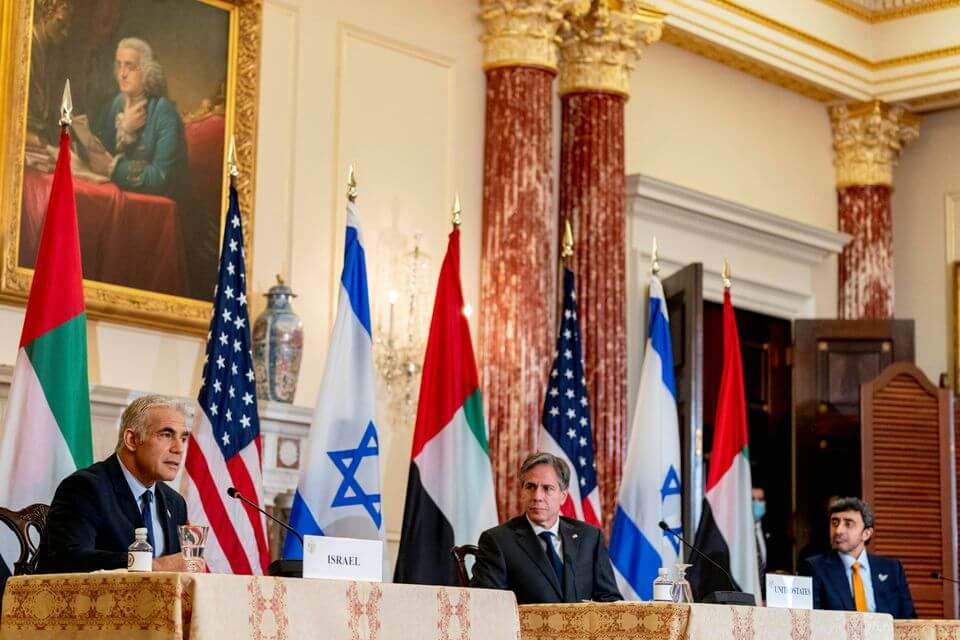Israeli Foreign Minister (FM) Yair Lapid met with his counterparts from the United States (US) and the United Arab Emirates (UAE)—Antony Blinken and Sheikh Abdullah bin Zayed al Nahyan—in Washington on Wednesday. Lapid’s visit to Washington comes at a time when Israel has raised concerns about recent escalatory actions taken by Iran regarding its nuclear programme.
During a joint press conference with Blinken and Bin Zayed, Lapid said Israel will consider “other options,” if diplomacy fails to address Israel’s concerns regarding Iran’s nuclear programme. “By saying other options, I think everyone understands, here, in Israel, in the Emirates, and in Tehran, what is it that we mean,” Lapid said, in a clear reference to military strikes on Iran’s nuclear facilities.
We have a lot to talk about: Iran, expanding the circle of normalization, and regional challenges. But before all of that, I think it’s important to dedicate a moment to discussing the strength and depth of the relationship between our two countries. pic.twitter.com/jRMtkqb3DK
— יאיר לפיד - Yair Lapid🟠 (@yairlapid) October 13, 2021
“Israel reserves the right to act at any given moment, in any way. That is not only our right, it is also our responsibility,” the Israeli FM affirmed, adding, “Iran has publicly stated it wants to wipe us out. We have no intention of letting that happen.”
Reiterating Lapid’s concerns, Blinken hinted that the US will consider military options if Iran does not return to the 2015 nuclear deal. “We will continue to look at every option to deal with the challenge that is posed by Iran. We believe that diplomacy is the best way to do that, but it takes two to engage in diplomacy,” he noted.
Adding that the US and Israel are “united in the proposition that Iran cannot be allowed to acquire a nuclear weapon,” Blinken said, before going on to say: “With every passing day, and Iran’s refusal to engage in good faith, the runway gets short.”
In a similar vein, Lapid told US National Security Advisor (NSA) Jake Sullivan on Tuesday that Israel is concerned over Iran “becoming a nuclear threshold state” and its “race towards nuclear capability.” Sullivan reaffirmed Washington’s commitment to ensure that “Iran never gets a nuclear weapon.”
Regarding the US’ plans to reopen its Palestinian mission in Jerusalem, Blinken said the US intends to go ahead with the move and engage officially with the Palestinians, despite Israel’s opposition. “We’ll be moving forward with the process of opening a consulate as part of deepening of those ties with the Palestinians,” he said.
In 2018, the US’ relations with Palestine were badly damaged when ex-President Donald Trump moved the US Embassy in Israel from Tel Aviv to Jerusalem. The US also closed its consulate in Palestine at the same time. After coming to power in January, President Joe Biden has said he would reopen the consulate in Jerusalem while leaving the embassy in place.
While Lapid made no comments about the US’ decision to reopen the consulate, he said Israel believes that “the Palestinians are entitled to quality of life, economy, education and hope” during a meeting with Vice President Kamala Harris on Tuesday.
Speaking at the press conference on Wednesday, UAE FM Bin Zayed said the three-way meeting was meant to “build bridges of cooperation” and is a “commitment to the necessity of changing the prevailing conditions in the region in the right direction.” He added, “We have succeeded in establishing a nation that respects values and recognises tolerance and co-existence,” and stressed that the “Abraham Accords Peace Agreement is a catalyst for establishing peace in the region.”
H.H. Sheikh Abdullah bin Zayed meets FMs of the U.S. and the State of Israel; and announces two new working groups on religious coexistence, water, and energyhttps://t.co/lFWbus3pGg pic.twitter.com/HnRbI0aVpC
— OFM (@OFMUAE) October 13, 2021
The Accords, introduced by Trump and signed by the UAE, Bahrain, Sudan, and Morocco, aim to normalise ties between Israel and the Arab world by pursuing a vision of “peace, security, and prosperity in the Middle East and around the world.”
In this regard, Bin Zayed announced that he would be visiting Israel soon. “I will visit Israel soon in order to meet our friends and partners. We need to not only celebrate this bilateral relationship but also to look forward to wider prospects of cooperation between the two nations,” he said.
Regarding the Palestinian conflict, Bin Zayed said that peace would not be possible if Israel and the Palestinians were not “on talking terms.” However, he noted that the UAE was “happy to see” that Israeli officials have been meeting with their Palestinian counterparts over the past few weeks.
The trio also discussed the ongoing situation in Yemen and Lebanon and talked about ways to engage cooperation in the economic, security, religious, and cultural fields.

